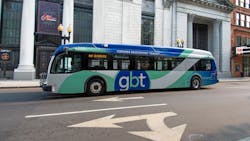FTA awards $20 million through Areas of Persistent Poverty Program
The Federal Transit Administration (FTA) has awarded $20 million to 47 communities through its Areas of Persistent Poverty (AoPP) program. The AoPP program provides support to state and local governments, transit agencies and nonprofit organizations to create better transit for residents with limited or no transportation options.
"Across the country, people who live in low-income rural, urban, and Tribal communities are less likely to own a car and more likely to rely on public transit," said U.S. Department of Transportation Secretary Pete Buttigieg. "Through this program, we are bringing affordable, accessible public transit to the very communities that need it the most, making it possible for more people to access jobs, resources and opportunity."
Investments from the AoPP program can be used to support efforts to initiate transit service, as well as improve service and modernize fleets, from procuring low- and no-emission buses, to launching scheduling apps and improving bus stops. They also deliver on the administration’s commitments to invest in projects that provide benefits to communities with environmental justice concerns.
"Transit is the great equalizer, providing rides for those who do not have a car or cannot drive, and particularly in rural and Tribal areas, having access to an affordable, reliable bus ride can mean the difference between isolation and opportunity," said FTA Administrator Nuria Fernandez. "FTA's Areas of Persistent Poverty Program is about forging connections for people who need accessible transit the most."
The grants are specifically awarded for studies to improve transit in Census-defined low-income areas. The program also supports coordinated human service transportation planning to improve mobility and access or provide new services, including paratransit.
Some of the selected projects include:
- The Greater Bridgeport Transit Authority in Connecticut will receive $450,000 to conduct a planning analysis targeting underserved communities. It will develop policy and planning processes that link equity with transit investment; a fleet, facility and deployment plan to transition the bus fleet to zero-emission propulsion systems; and an educational program for residents and business owners to better inform them about transit and mobility options.
- The Chicago Transit Authority (CTA) will receive $778,500 to assess whether to reopen the historic Englewood (Green) Line Racine station with modern accessibility standards. The station, which closed nearly 30 years ago, is recognized as a key investment to revitalize the neighborhood. By engaging with residents and other advocates, CTA hopes to maximize the impact of increased transit access and the positive effect it can have on the community.
- In Mississippi, the Jackson Medical Mall Foundation will receive $612,684 to develop a framework to expand transportation options with a community-based transportation model, allowing residents to search, book and ride on available transit assets. The proposed plan looks to improve public transportation by improving efficiency and ensuring their system meets the needs of individuals who lack access to jobs, schools, healthcare and public services in central Mississippi and throughout the state.
- The Cherokee Nation, located in northeastern Oklahoma, will receive $576,188 to update its long-range transit plan to guide the planning, construction and deployment of future tribal transit projects. The review will include an electric vehicle infrastructure assessment to plan for expansion and a technology assessment designed to increase user access for its 450,000 tribal citizens.
FTA received applications totaling close to $36 million in funding requests. Projects were selected based on criteria described in the Notice of Funding Opportunity.
